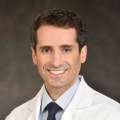Neurosurgeon Residency Training
Welcome to the UCLA Department of Neurosurgery Residency Program. The rigorous core curriculum is designed to train residents to achieve educational, clinical, academic and technical excellence. UCLA's clinical environment provides residents with a breadth and depth of experience by virtue of the extensive population of patients served, the multiple facilities through which residents rotate, and the broad scope of faculty expertise.
Residents obtain the majority of their core clinical training at UCLA Ronald Reagan Medical Center - a quaternary referral center and level I trauma center. This is supplemented by rotations at four other major metropolitan hospitals allowing for breadth and diversity of clinical experiences. Each hospital provides a unique, but complementary, training environment that allows trainees to the full gamut of neurosurgery practice. The clinical training at UCLA aims to ensure early operative exposure and subsequent graduated autonomy allowing for residents to develop technical excellence. Alongside the extraordinary sound foundation of clinical practice provided by the core curriculum, the residency program has built in flexibility that allows for residents to customize their training curriculum to meet their individual needs. The 7th year of training is a 'Transition to Academic Practice' year, allowing each resident to design their individual curriculum to foster their professional development: accommodating focused clinical subspecialty electives, additional research experience or an enfolded clinical fellowship.
In addition to providing robust clinical training, our goal is to produce the next generation of leaders who, through innovation in basic science and/or clinical research, will advance the field of neurosurgery. The residency curriculum prepares our graduates for academic success with a research curriculum and one dedicated year of research. This experience is just the foundation, with many of our residents expanding their research opportunities in subsequent years, including obtaining advanced degrees. As one of the world's leading research universities, UCLA offers nearly unparalleled, diverse resident research opportunities. Accordingly, the academic productivity of the UCLA residency program is ranked second highest in the country among all neurosurgical programs (Taylor et al., J Neurosurg 123:547–560, 2015).
Outside the close-knit departmental community, UCLA neurosurgery residents enjoy the rich cultural experience and amenities of living in one of the great cities of the world. The UCLA Medical Center, clinics, and multitude of medical research buildings are situated directly on the UCLA campus in Westwood, only five miles from the beautiful Pacific Ocean. The surrounding city of Los Angeles provides endless opportunities for great food and entertainment.
We welcome you to UCLA Neurosurgery!
Sincerely,

